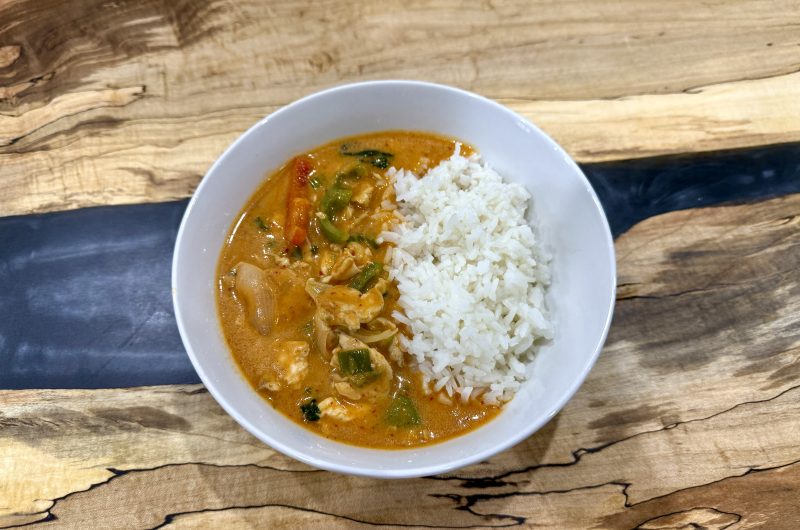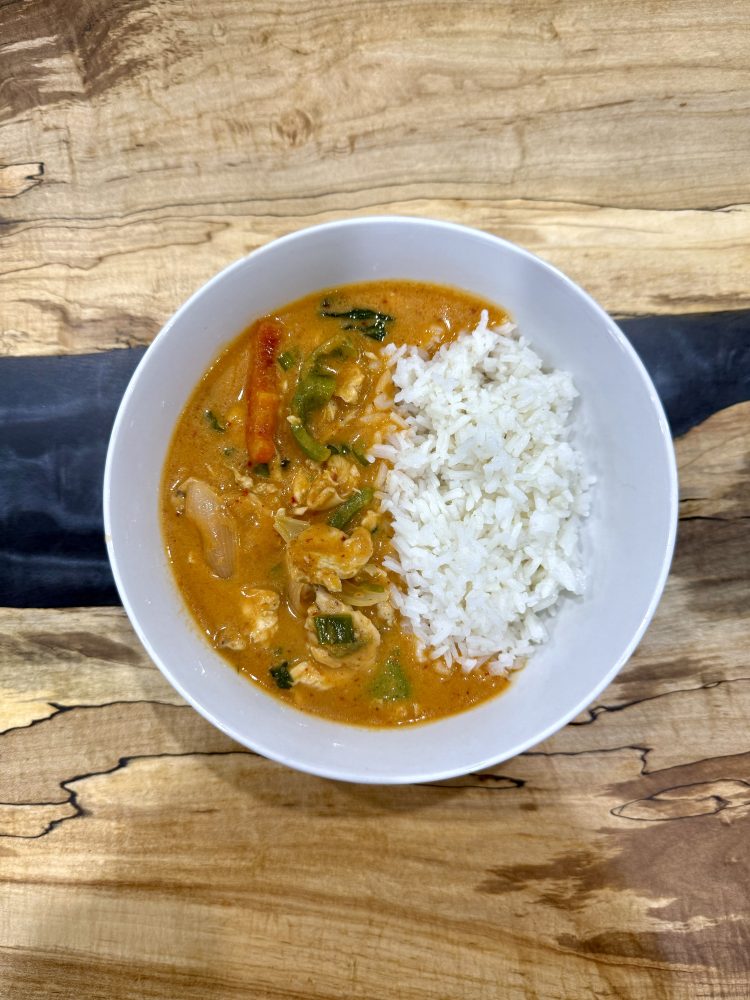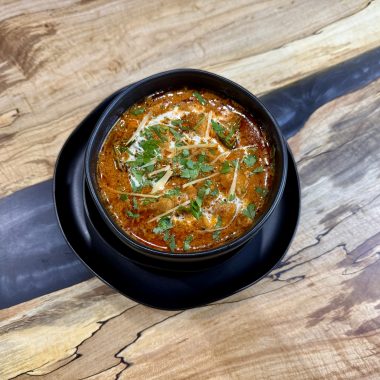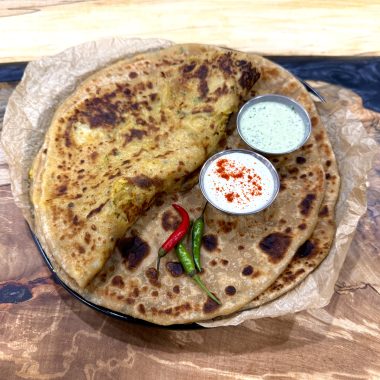Thai Penang Curry: A Fusion of Aromatic Flavors
Thai Penang curry is a fragrant and creamy delight, a staple of Thai cuisine that combines rich coconut milk, aromatic spices, and tender protein. This dish is renowned for its balance of spicy, sweet, and savory flavors. Originating from the southern regions of Thailand and inspired by the Malaysian island of Penang, this curry is perfect for anyone who enjoys the complexity of Thai food. In this blog post, we’ll guide you through making an authentic Thai Penang curry at home, ensuring each bite is packed with flavor.
The Key to Tender and Juicy Chicken: Cutting Against the Grain
When preparing the chicken for Thai Penang curry, one crucial step is slicing it against the grain. This technique ensures that the chicken remains tender and juicy throughout the cooking process. By cutting against the grain, the muscle fibers are shortened, making the chicken less chewy and easier to cook evenly. As a result, the chicken absorbs the flavors of the curry paste, coconut milk, and herbs without becoming tough or dry.
Choosing High-Quality Coconut Milk for a Fragrant Curry
Coconut milk is the heart of Penang curry, providing its creamy texture and rich flavor. It’s essential to choose a high-quality coconut milk brand because it significantly affects the dish’s aroma and taste. Low-quality coconut milk often contains additives and lacks the fragrant essence that defines an authentic Thai curry. A good quality coconut milk will not only enhance the curry’s texture but also infuse it with a fresh, tropical aroma, making every spoonful a delight.
Fresh Ingredients and Herbs: The Secret to Authentic Flavor
For a truly authentic Thai Penang curry, fresh ingredients are key. The use of fresh ginger, garlic, and green chili paste brings an aromatic base to the dish, creating layers of flavor as the curry simmers. Fresh herbs, especially basil, are crucial for the cohesiveness of the overall dish. Basil adds a fragrant, peppery note that complements the richness of the curry, tying all the flavors together beautifully. Cilantro and scallions, used as garnishes, add a refreshing element that brightens the dish and balances the spice.
The Importance of Peanut Butter: Depth of Flavor in Every Bite
A distinctive feature of Penang curry is its nutty undertone, achieved by incorporating peanut butter. While it may seem like a small addition, peanut butter is crucial for adding depth and richness to the curry. It brings a subtle sweetness that complements the spiciness of the curry paste. Additionally, it thickens the sauce, giving it a velvety texture that coats the chicken and vegetables perfectly. For those looking for added crunch and texture, crushed peanuts can be sprinkled on top as an optional garnish, enhancing the nutty flavor profile.
Customizing Your Curry: Protein Choices and Spice Levels
Thai Penang curry is versatile, allowing you to customize the dish based on your preferences. While chicken is a classic choice, you can easily swap it for other proteins like shrimp, beef, or tofu for a vegetarian option. Adjusting the cooking time to suit your protein will ensure everything is cooked to perfection.
Spice levels are another area where you can tailor the curry to your liking. If you prefer a spicier kick, increase the amount of fresh green chili paste. This paste adds not only heat but also a vibrant, zesty flavor that enhances the curry. Alternatively, if you prefer a milder version, reduce the chili paste or omit it altogether.
Controlling the Thickness: Adjusting Water for Your Preferred Consistency
One of the great things about Thai Penang curry is the ability to adjust its consistency based on your preference. For a thicker, richer curry, reduce the amount of water added to the sauce. This will concentrate the flavors, making each bite more intense and creamy. If you prefer a lighter curry, add the full cup of water as indicated in the recipe. The flexibility in adjusting the water content allows you to control the dish’s final texture, ensuring it’s just how you like it.
Step-by-Step Instructions for Thai Penang Curry
Ingredients You’ll Need
Before you begin cooking, gather all the necessary ingredients:
• 1 lb boneless chicken breast (thinly sliced against the grain)
• 1/4 cup red bell pepper, sliced
• 1/4 cup green bell pepper, sliced
• 1/2 onion, sliced
• 1 tsp ginger paste
• 1 tsp garlic paste
• 1 tsp green chili paste
• 1 tbsp peanut butter
• 2 tbsp Penang curry paste
• 1 cup water (adjust for preferred thickness)
• 1/2 cup high-quality coconut milk
• 1 tsp chicken powder or bouillon
• 1/2 tbsp cornstarch slurry
• 2 tsp lime juice
• 1 tsp fish sauce
• 1 tbsp brown sugar
• Salt and black pepper to taste
• 3 tsp oil
• Chopped cilantro, scallions, and fresh basil for garnish
• Crushed peanuts (optional)- Stir-Fry the Vegetables
Heat 1/2 tsp of oil in a hot wok. Stir-fry the red and green bell peppers along with the sliced onion until they are tender but still crisp. This step preserves the freshness and crunch of the vegetables, providing texture and color to the dish. Remove the vegetables from the wok and set them aside.
- Cook the Chicken
In the same wok, add the remaining oil and stir-fry the chicken slices with ginger, garlic, and green chili paste on high heat. Stir until the chicken changes color and the aromatics are well incorporated. This helps the chicken absorb the spices while staying juicy and tender.
- Add the Curry Paste and Peanut Butter
Add the Penang curry paste and peanut butter to the wok, stirring well to coat the chicken. This step allows the spices to bloom and the flavors to meld, creating a robust base for the curry. The peanut butter adds a creamy, nutty flavor that’s essential for the dish.
- Simmer the Curry
Pour in the water and let the curry simmer for a few minutes on medium heat. For a thicker curry, reduce the water quantity. Simmering allows the flavors to develop fully and the sauce to thicken gradually.
- Incorporate Coconut Milk and Thicken the Sauce
Add the high-quality coconut milk to the curry, stirring until well combined. Coconut milk adds a creamy texture and a fragrant aroma that’s characteristic of Thai curries. To achieve the perfect consistency, add the cornstarch slurry and mix until the curry thickens to your liking.
- Season the Curry
Season the curry with lime juice, fish sauce, and brown sugar. These elements balance the flavors, providing a combination of tanginess, umami, and sweetness. Adjust the salt and pepper to your taste, ensuring all the flavors come together harmoniously.
- Add the Vegetables and Garnish
Add the stir-fried vegetables back into the curry, stirring to combine. Garnish with chopped cilantro, scallions, and fresh basil. These fresh herbs add a burst of flavor, enhancing the overall aroma and taste. The basil, in particular, ties the dish together, making the curry vibrant and cohesive.
Serving Suggestions
Serve this Thai Penang curry immediately with steamed white rice. The rice soaks up the creamy sauce, making each bite a perfect balance of flavor and texture. You can also pair it with a Thai cucumber salad for a refreshing contrast or enjoy it alongside a cool, iced tea.
Conclusion: Bring Thai Cuisine to Your Kitchen
Thai Penang curry is a beautiful, aromatic dish that brings the essence of Thai cuisine into your home. By using fresh ingredients, high-quality coconut milk, and the right techniques, you can create an authentic curry that’s rich in flavor and texture. Whether you prefer it spicy, mild, thick, or creamy, this curry can be customized to suit your taste. So why not take a culinary journey and enjoy the vibrant flavors of Thai Penang curry today?







